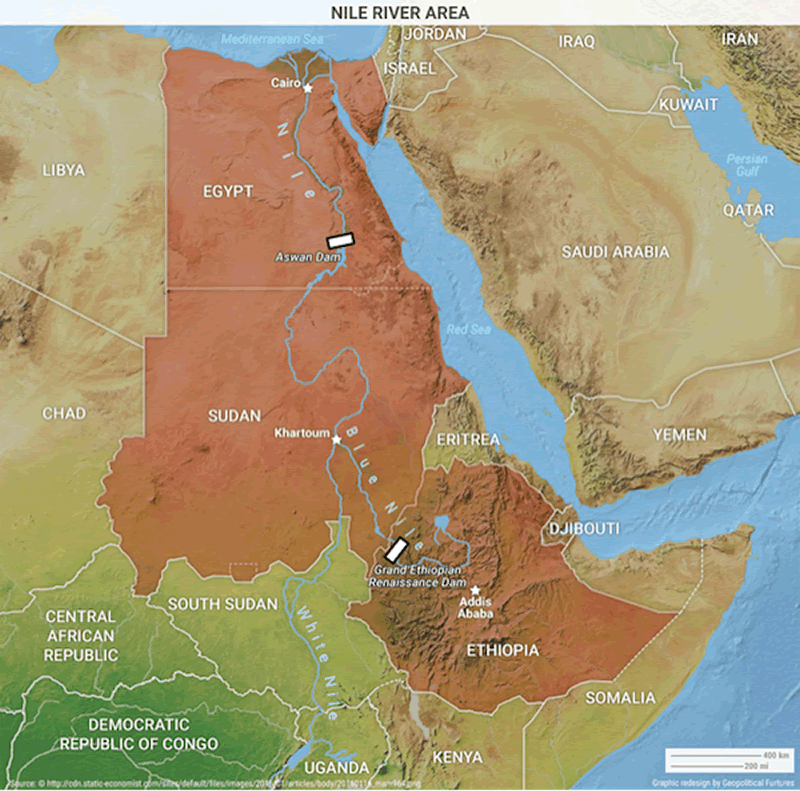3 Maps Show How Water Access Can Make Or Break A Nation
Politics / Water Sector Mar 07, 2017 - 12:52 PM GMTBy: John_Mauldin
 BY GEORGE FRIEDMAN AND ALLISON FEDIRKA : Access to and control over water is a strategic imperative for all countries. As such, it has been a source of conflict throughout history.
BY GEORGE FRIEDMAN AND ALLISON FEDIRKA : Access to and control over water is a strategic imperative for all countries. As such, it has been a source of conflict throughout history.
Water access can impact a country’s geopolitics in many ways. The first (and one of the most obvious) is sea access. Access to the world’s oceans enables a country to use major maritime shipping routes. It also opens an additional route by which a country could project force by having a navy.
The need to gain and maintain ocean access can lead to war. One major factor in the War of the Pacific in South America (1879-1883) was control over access to the southern Pacific. Bolivia lost its ocean access as a result of this war, and to this day, continues to seek ways to recover it.
A more current example is Russia's invasion of Crimea. The goal here was to create a larger buffer around Russian naval facilities in Sevastopol.
The Mighty Mississippi

Access to waterways also clearly impacts trade. Rivers provide cheaper means of shipping goods to port for export. This makes a country’s exports more competitive.
I’ve written extensively about US strategy as it applies to water access in This Week in Geopolitics (subscribe here for free). One of the most strategic riverways in the world is the Mississippi River system in the US.
Two great rivers, the Missouri and the Ohio, flow into the Mississippi. This river system is navigable and empties into the Gulf of Mexico.
This waterway allows virtually any part of the land between the Rockies and Appalachians to ship goods inexpensively through this river system and on to other countries.
In this case, the US acquired these lands primarily through the Louisiana Purchase. That was followed by a war with Mexico and the annexation of Texas. This led to the expansion of a buffer zone to the west of the Mississippi River.
The Nile

Rivers can also be sources of power in terms of relations between states. This is the case with the Nile River.
Approximately 85% of all water reaching the Nile River in Egypt originates in Ethiopia from the Blue Nile, Atbara, and Sobat rivers. Of these rivers, the most important is the Blue Nile. It accounts for nearly 60% of the Nile’s water in Egypt.
Given that Egypt is mostly a desert climate, the country depends on the river for water and agriculture. At present, Egypt has concerns over the Grand Ethiopian Renaissance Dam (which should be operational this year). Any moves made by Ethiopia that affect water flow or quality could jeopardize water access downstream.
So far, this concern has been dealt with through diplomacy. But in the mid-1870s, the Khedevite of Egypt invaded Ethiopia via Eritrea in an attempt to gain control of the Nile River. This war lasted for two years.
Syria’s Droughts

The absence of water can indirectly lead to conflict. This map shows areas in Syria where there were six or more years of drought from 2000 to 2010. Prolonged droughts can destroy a region’s agriculture and livestock, exposing local food supplies to great risk.
The Islamic State took control of some of this territory only a few years after the drought. The United Nations International Strategy for Disaster Reduction published a study in 2011 that looked at this drought. The report implies that social and economic ruin caused by drought contributed to the rise of IS.
Historians have also noted a correlation between major famine due to drought in Ethiopia and the fall of regimes, such as the Derg.
While drought in these cases did not serve as a direct trigger for observed violence, there is a strong correlation between the absence of water and social and economic instability.
The Importance of Access
Water has an underlying geopolitical importance. Access and control over this feature can provide strategic standing to a country. In some cases, it can even enhance this standing in terms of military projection, trade, domestic stability, and leverage over other countries. For this reason, water can be a great source of conflict among nations… conflict that has the potential to rise to the level of warfare.
Watch George Friedman's Ground-breaking Documentary, Crisis & Chaos: Are We Moving Toward World War III?
Russian adventurism. An ailing EU. Devastation in the Middle East. These are just three symptoms of a systemic instability engulfing a region that’s home to 5 billion of the planet’s 7 billion people.
In this provocative documentary from Mauldin Economics and Geopolitical Futures, George Friedman uncovers the crises convulsing Europe, the Middle East, and Asia… and reveals the geopolitical chess moves that could trigger global conflict. Register to watch the documentary now.
John Mauldin Archive |
© 2005-2022 http://www.MarketOracle.co.uk - The Market Oracle is a FREE Daily Financial Markets Analysis & Forecasting online publication.



